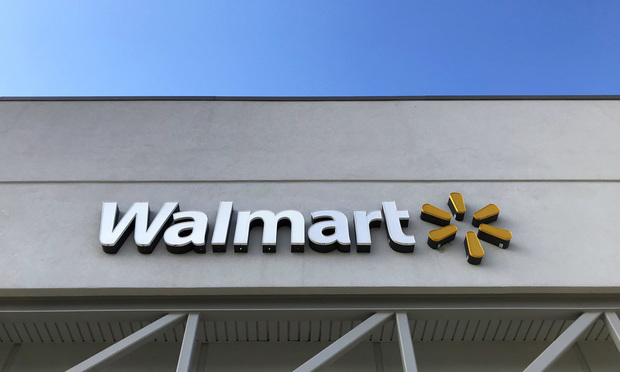$160M Settlement Approved by Arkansas Federal Judge in Walmart Bribery Suit
A federal judge in Arkansas on Tuesday gave her final approval to a $160 million settlement in a securities class action stemming from the alleged bribery scheme involving Walmart's Mexican subsidiary.
April 09, 2019 at 05:31 PM
3 minute read
 Walmart store. Photo: Diego M. Radzinschi/ALM
Walmart store. Photo: Diego M. Radzinschi/ALM
A federal judge in Arkansas on Tuesday gave her final approval to a $160 million settlement in a securities class action stemming from the alleged bribery scheme involving Walmart's Mexican subsidiary.
The agreement, approved by U.S. Judge Susan O. Hickey of the Western District of Arkansas, brought an end to long-running litigation from Walmart investors who said they were affected by a sharp drop in the retail giant's stock after The New York Times reported in 2012 that the company had tried to cover up $24 million in bribes that executives from Walmart de Mexico had paid to high-ranking Mexican officials in order to speed up store openings.
Walmart, which did not admit any wrongdoing, didn't respond Tuesday to a call seeking comment on the settlement. Under the agreement, Walmart was required to pay the cost of administering the settlement, as well legal fees and expenses.
Robbins Geller Rudman & Dowd, which represented the lead plaintiff in the case, meanwhile touted the ruling as a “extraordinary result” after a series of other suits over the alleged bribery scheme had failed.
Last year, the Delaware Supreme Court upheld the dismissal of lawsuits by a dozen pension funds accusing Walmart's directors of failing to investigate reports of bribery, after Hickey extinguished similar derivative claims in Arkansas, where Walmart is headquartered. The U.S. Court of Appeals for the Second Circuit also affirmed a New York court's ruling that investor claims were barred by the five-year statute of limitation under the Sarbanes-Oxley Act.
According to proxy advisory firm Institutional Shareholder Services, the settlement was Walmart's first ever in a securities class action case and the largest of its kind to be approved in Arkansas federal court, a spokesman for Robbins Geller said Tuesday.
“They took on one of the most powerful companies in the world in its own backyard and obtained a financial recovery that far exceeds any other class action recovery against Walmart,” Robbins Geller said, crediting the leadership of its client, the City of Pontiac General Employees' Retirement System, and its chairman, Walter Moore.
According to court documents, executives at Walmart de Mexico, or Walmex, began paying bribes to government officials in 2003 through intermediaries to obtain land use permits, reductions in environmental impact fees and other allowances.
Walmart conducted an internal investigation in 2006 and concluded there was no evidence of a bribery scheme.
But six years later, The New York Times published reports detailing the alleged scheme in which government officials received $24 million and an effort by Walmart executives to halt and cover up the internal investigation.
Following publication of the article, Congress announced the launch of a federal probe into the bribery allegations.
In the Arkansas class action, the City of Pontiac General Employees' Retirement System said that Walmart's stock plunged nearly 5 percent on news of the Time's reporting, leading to “billions of dollars” in lost shareholder value. The stock price continued to decline in the following days, amounting to its largest one- and two-day drops since the stock markets had bottomed out over three years earlier, the complaint said.
Walmart said last year, after the settlement was initially announced, that it had years before implemented a global ethics and compliance program.
This content has been archived. It is available through our partners, LexisNexis® and Bloomberg Law.
To view this content, please continue to their sites.
Not a Lexis Subscriber?
Subscribe Now
Not a Bloomberg Law Subscriber?
Subscribe Now
NOT FOR REPRINT
© 2025 ALM Global, LLC, All Rights Reserved. Request academic re-use from www.copyright.com. All other uses, submit a request to [email protected]. For more information visit Asset & Logo Licensing.
You Might Like
View All
Albertsons Gives Up on $25B Merger, Sues Kroger Seeking 'Billions of Dollars'

Amazon Sellers: Walmart Marketplace Supports Organized Retail Crime
3 minute read

Trending Stories
- 1FTC Launches Inquiry of Single-Family Rental Home 'Mega Investors,' Issues PBM Report
- 2Womble Bond Dickinson's Wilmington Office Sees New Leadership as Merger Is Completed
- 3Defending Against a $290M Claim and Scoring a $116M Win in Del. Drug Patent Fight
- 4Jury Awards $6.2 Million in Walmart Slip & Fall
- 5'If the Job Is Better, You Get Better': Chief District Judge Discusses Overcoming Negative Perceptions During Q&A
Who Got The Work
J. Brugh Lower of Gibbons has entered an appearance for industrial equipment supplier Devco Corporation in a pending trademark infringement lawsuit. The suit, accusing the defendant of selling knock-off Graco products, was filed Dec. 18 in New Jersey District Court by Rivkin Radler on behalf of Graco Inc. and Graco Minnesota. The case, assigned to U.S. District Judge Zahid N. Quraishi, is 3:24-cv-11294, Graco Inc. et al v. Devco Corporation.
Who Got The Work
Rebecca Maller-Stein and Kent A. Yalowitz of Arnold & Porter Kaye Scholer have entered their appearances for Hanaco Venture Capital and its executives, Lior Prosor and David Frankel, in a pending securities lawsuit. The action, filed on Dec. 24 in New York Southern District Court by Zell, Aron & Co. on behalf of Goldeneye Advisors, accuses the defendants of negligently and fraudulently managing the plaintiff's $1 million investment. The case, assigned to U.S. District Judge Vernon S. Broderick, is 1:24-cv-09918, Goldeneye Advisors, LLC v. Hanaco Venture Capital, Ltd. et al.
Who Got The Work
Attorneys from A&O Shearman has stepped in as defense counsel for Toronto-Dominion Bank and other defendants in a pending securities class action. The suit, filed Dec. 11 in New York Southern District Court by Bleichmar Fonti & Auld, accuses the defendants of concealing the bank's 'pervasive' deficiencies in regards to its compliance with the Bank Secrecy Act and the quality of its anti-money laundering controls. The case, assigned to U.S. District Judge Arun Subramanian, is 1:24-cv-09445, Gonzalez v. The Toronto-Dominion Bank et al.
Who Got The Work
Crown Castle International, a Pennsylvania company providing shared communications infrastructure, has turned to Luke D. Wolf of Gordon Rees Scully Mansukhani to fend off a pending breach-of-contract lawsuit. The court action, filed Nov. 25 in Michigan Eastern District Court by Hooper Hathaway PC on behalf of The Town Residences LLC, accuses Crown Castle of failing to transfer approximately $30,000 in utility payments from T-Mobile in breach of a roof-top lease and assignment agreement. The case, assigned to U.S. District Judge Susan K. Declercq, is 2:24-cv-13131, The Town Residences LLC v. T-Mobile US, Inc. et al.
Who Got The Work
Wilfred P. Coronato and Daniel M. Schwartz of McCarter & English have stepped in as defense counsel to Electrolux Home Products Inc. in a pending product liability lawsuit. The court action, filed Nov. 26 in New York Eastern District Court by Poulos Lopiccolo PC and Nagel Rice LLP on behalf of David Stern, alleges that the defendant's refrigerators’ drawers and shelving repeatedly break and fall apart within months after purchase. The case, assigned to U.S. District Judge Joan M. Azrack, is 2:24-cv-08204, Stern v. Electrolux Home Products, Inc.
Featured Firms
Law Offices of Gary Martin Hays & Associates, P.C.
(470) 294-1674
Law Offices of Mark E. Salomone
(857) 444-6468
Smith & Hassler
(713) 739-1250






